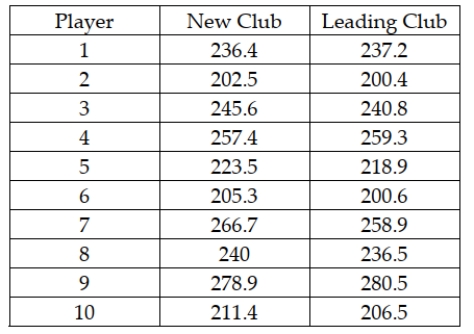Most companies that make golf balls and golf clubs use a one-armed robot named "Iron Byron" to test their balls for length and accuracy, but because of swing variations by real golfers, these test robots don't always indicate how the clubs will perform in actual use. One company in the golfing industry is interested in testing its new driver to see if it has greater length off the tee than the best-selling driver. To do this, it has selected a group of golfers of differing abilities and ages. Its plan is to have each player use each of the two clubs and hit five balls. It will record the average length of the drives with each club for each player. The resulting data for a sample of 10 players are:  What is an appropriate null hypothesis to be tested?
What is an appropriate null hypothesis to be tested?
A) H0 : μ1 = μ2
B) H0 : μ1 ≥ μ2
C) H0 : μd ≤ 0
D) H0 : μD = 0
Correct Answer:
Verified
Q63: If we are testing for the difference
Q64: Suppose that a group of 10 people
Q65: Most companies that make golf balls and
Q66: In conducting a hypothesis test for the
Q67: There have been complaints recently from homeowners
Q69: In testing for differences between the means
Q70: There have been complaints recently from homeowners
Q71: The t-test for the mean difference between
Q72: To increase productivity, workers went through a
Q73: Assume that 20 people participated in a
Unlock this Answer For Free Now!
View this answer and more for free by performing one of the following actions

Scan the QR code to install the App and get 2 free unlocks

Unlock quizzes for free by uploading documents